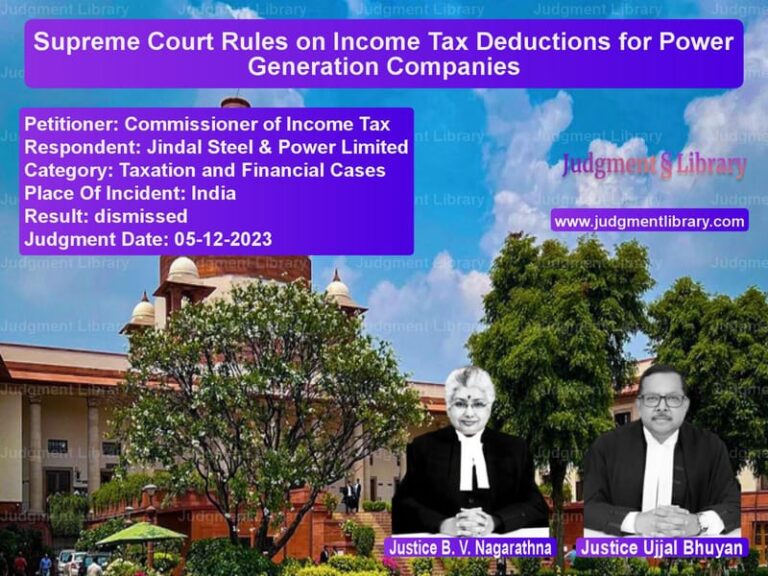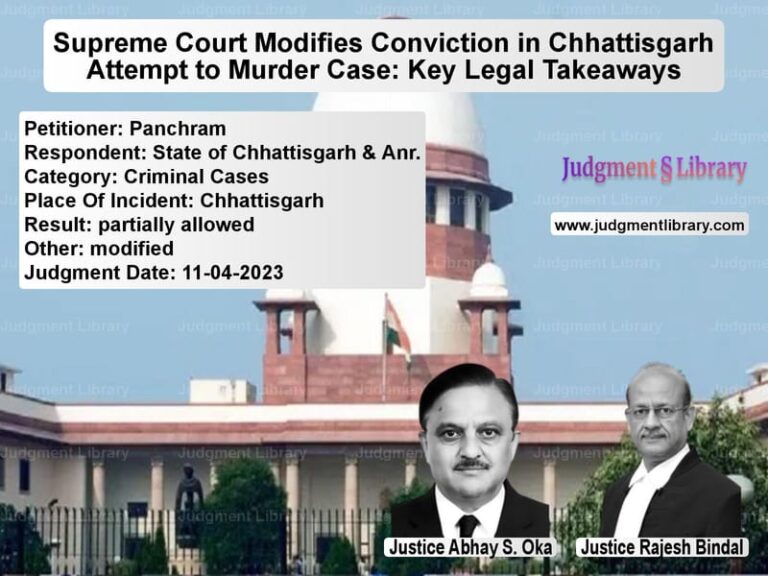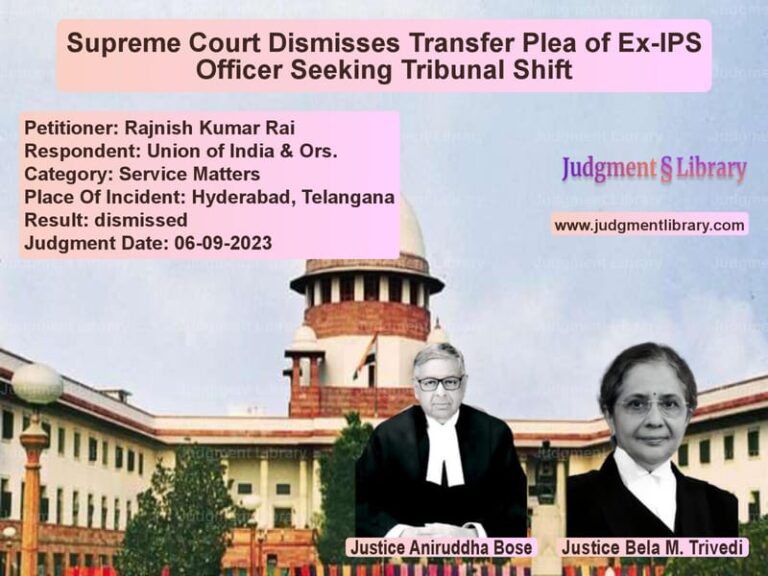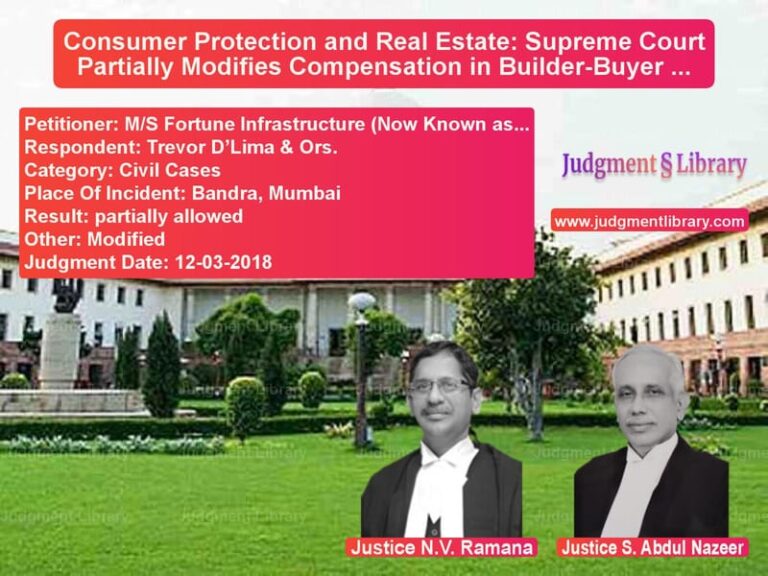Confidentiality in Conciliation Proceedings: Supreme Court’s Landmark Ruling
The case of Govind Prasad Sharma & Ors. vs. Doon Valley Officers Cooperative Housing Society Ltd. addressed an important legal issue regarding the confidentiality of conciliation proceedings and the admissibility of evidence derived from such proceedings. The dispute centered around whether a demarcation report prepared during conciliation proceedings could be used as evidence in court. The Supreme Court, in its judgment, clarified the principles governing confidentiality under the Arbitration and Conciliation Act, 1996.
The appellants challenged an order of the Uttarakhand High Court, which had allowed the admission of a demarcation report in evidence. The Supreme Court, reversing the High Court’s ruling, held that such reports, being a product of conciliation, are confidential and cannot be relied upon in judicial proceedings.
Background of the Case
The appellants, Govind Prasad Sharma and others, contested a judgment of the Uttarakhand High Court dated December 12, 2014, which permitted a demarcation report made during conciliation proceedings to be used as evidence. The dispute originally involved property demarcation, and the report was prepared by a government agency as part of conciliation between the parties.
The Special Judge at Dehradun, relying on Sections 75 and 81 of the Arbitration and Conciliation Act, 1996, dismissed a revision petition challenging an earlier order that refused to admit the report in evidence. However, the High Court later overturned this ruling and admitted the report, leading the appellants to approach the Supreme Court.
Key Legal Issues
- Whether confidentiality provisions under Sections 75 and 81 of the Arbitration and Conciliation Act, 1996, prohibit the use of conciliation reports as evidence.
- Whether evidence originating from conciliation proceedings can be introduced in judicial proceedings.
- The scope of confidentiality in alternative dispute resolution mechanisms.
Arguments by the Petitioner (Govind Prasad Sharma & Ors.)
The appellants, represented by senior counsel, argued that:
- Section 75 of the Arbitration and Conciliation Act mandates absolute confidentiality for all matters relating to conciliation.
- Section 81 explicitly prohibits reliance on proposals, admissions, or reports arising from conciliation in judicial or arbitral proceedings.
- The demarcation report was prepared solely within the context of conciliation and should therefore remain confidential.
- Allowing such a report to be used as evidence would discourage parties from participating in conciliation in the future.
Arguments by the Respondent (Doon Valley Officers Cooperative Housing Society Ltd.)
The respondents countered with the following arguments:
- The specific provisions of Section 81 did not apply to the demarcation report as it was not a settlement proposal but a factual document.
- Confidentiality should not extend to reports that serve an evidentiary purpose in property disputes.
- Parties should not be permitted to suppress material evidence by claiming confidentiality.
- There was no absolute bar on using conciliation-related documents if they did not fall within the restricted categories of Section 81.
Supreme Court’s Judgment
The Supreme Court, in a judgment delivered by Justices R.F. Nariman and Sanjay Kishan Kaul, ruled in favor of the appellants. The Court held that confidentiality under Sections 75 and 81 must be strictly observed and that any report prepared as part of conciliation proceedings cannot be admitted as evidence in judicial proceedings.
The Court stated:
“The object of Section 75 is sub-served by the expression ‘relating to,’ which is of extremely wide import. Both the conciliator and the parties must keep as confidential all matters relating to conciliation proceedings.”
Referring to precedent, the Court observed that the test for determining whether a matter relates to conciliation proceedings is whether recourse to the conciliation process is necessary to establish its origin. Since the demarcation report had its genesis solely in conciliation proceedings, it was deemed inadmissible.
Key Takeaways from the Judgment
The Supreme Court’s ruling reaffirmed the importance of confidentiality in conciliation and arbitration. The key takeaways from the judgment are:
- Strict Confidentiality: Sections 75 and 81 ensure that all matters relating to conciliation remain confidential.
- Admissibility of Evidence: Documents originating from conciliation cannot be introduced in judicial proceedings.
- Encouraging Alternative Dispute Resolution: The ruling reinforces the objective of conciliation by assuring parties that discussions and reports will not be used against them in litigation.
- Exceptions: The Court allowed parties to introduce independently obtained reports, provided they were not derived from conciliation proceedings.
Impact of the Judgment
This ruling has far-reaching implications for arbitration and conciliation in India. It ensures that parties can engage in dispute resolution without fear of their statements or reports being used against them in subsequent legal battles. It also clarifies that confidentiality must be maintained even if a document does not explicitly fall under the restricted categories of Section 81.
By setting a strong precedent, this judgment strengthens India’s alternative dispute resolution framework and aligns it with international best practices.
Conclusion
The Supreme Court’s decision in Govind Prasad Sharma & Ors. vs. Doon Valley Officers Cooperative Housing Society Ltd. upholds the sanctity of confidentiality in conciliation proceedings. It ensures that parties engaging in conciliation can do so without concern that records generated during the process will be used in court.
This ruling reinforces trust in alternative dispute resolution mechanisms, ensuring that conciliation remains a viable and effective means of resolving disputes outside of litigation.
Don’t miss out on the full details! Download the complete judgment in PDF format below and gain valuable insights instantly!
Download Judgment: Govind Prasad Sharma vs Doon Valley Officers Supreme Court of India Judgment Dated 23-08-2017.pdf
Direct Downlaod Judgment: Direct downlaod this Judgment
See all petitions in Conciliation Proceedings
See all petitions in Arbitration Act
See all petitions in Dispute Resolution Mechanisms
See all petitions in Judgment by Rohinton Fali Nariman
See all petitions in Judgment by Sanjay Kishan Kaul
See all petitions in allowed
See all petitions in Quashed
See all petitions in supreme court of India judgments August 2017
See all petitions in 2017 judgments
See all posts in Arbitration and Alternate Dispute Resolution Category
See all allowed petitions in Arbitration and Alternate Dispute Resolution Category
See all Dismissed petitions in Arbitration and Alternate Dispute Resolution Category
See all partially allowed petitions in Arbitration and Alternate Dispute Resolution Category







